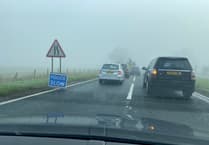A BUSINESS?owner is lobbying the Government in a bid to get more support for rural policing after his premises was targeted for a second time by ram-raiders.
Mike Garwood fears matters can only get worse if the police are further starved of cash.
Having been hit twice by ram-raiders in the past 18 months, Mike Garwood Farm Machinery of Shelleys Lane, East Worldham, is not only thousands of pounds out of pocket but the attacks by gangs of masked men are, said Mr Garwood, “extremely frightening”.
While he has total confidence that the police are addressing the issue in the best way they can, he believes cuts to the police budget are making it difficult for them to provide a rural service that is man enough to tackle this sort of crime.
With the police unable to get to the scene on time and with limited manpower, Mr Garwood feels that parts of rural Hampshire are falling to “mob rule”, with gangs of thieves stealing to order and getting away with it.
Originally based in Holybourne, the company, which sells and maintains farm machinery, was hit in February last year when five masked men in a silver Subaru Forrester rammed into the door of the showroom and made off with thousands of pounds of Stihl chainsaws and pressure washers.
Garwoods had just about recovered from that episode when, in the early hours of June 23 this year, a gang of thugs struck again. Dramatic CCTV footage shows eight men, all with faces covered, as they reversed a stolen Land Rover into the large reinforced showroom doors, before making off with chainsaws and other equipment worth in the region of £25,000.
Timed at around 3.15am, it was a raid that took less than four minutes to execute and, despite the alarm going off, gave the thieves plenty of time to get away.
In describing the incident during an interview last week with the BBC, Mr Garwood said: “They smashed in the doors, they stole whatever they could get. They then set fire to the Land Rover. It was just like a bomb had hit the place.
“It’s really upsetting when you see it. It’s very difficult to get the police here in time. It’s mob rule isn’t it?”
Having also been burgled numerous times, Mike Garwood is so concerned over the apparent inability of the police to address the problem that he has taken his case to Hampshire police and crime commissioner Simon Hayes.
Mr Hayes has lobbied MPs, warning that future government cuts could leave police dangerously stretched.
He told the BBC: “We set up a rural policing strategy in July 2014 to raise the profile of crime in rural areas, and also to raise the attention it gets from Hampshire Constabulary, and that is happening.”
Speaking at a meeting with the Alton and Petersfield branch of the National Farmers Union in April on the subject of rural policing, Mr Hayes emphasised how Hampshire Constabulary is operating against a backdrop of cuts. He was of the opinion that people in rural communities should exercise their individual responsibility to help by protecting their property and continuing to report crime so trends could be identified and resources allocated, where possible.
In praising Hampshire Constabulary for its efficient service, delivered with shrinking resources, the police and crime commissioner said it would be “a huge mistake” if the government were to make further cuts to police budgets.
On the subject of Mike Garwood Farm Machinery, Hampshire Constabulary, which is yet to make an arrest over the raids, pointed out that because rural crime had fewer witnesses and offered greater opportunities for criminals to target isolated sites, it was difficult to address.
A spokesman said: “We have been working to make significant improvements to our approach to rural policing and make the area a hostile place for criminals.”
Hampshire Police’s Countrywatch initiative, which was previously district based, now has a county-wide structure and this has improved intelligence gathering, with rural communities urged to report crime and suspicious activities so that the Countrywatch team can alert its members.
April this year also saw the relaunch of the Rural Services Network, a website that aims to tackle crime in the countryside by encouraging rural communities to add their experiences.
It would seem rural businesses needs all the help they can get in protecting themselves against organised crime. Insurers NFU Mutual reported an eight per cent rise in rural crime in the county in 2013, costing the local economy about £1m, while figures out next month are expected to show a further “alarming” rise in 2014, making Hampshire the third biggest victim in the UK, according to the insurers.
In seeking to further raise awareness of the problem, Mr Garwood is urging the rural community to join him in lobbying the government to heed the warning about rural crime and to make sure there is sufficient funding to provide an efficient police force to protect and uphold law and order.
He said: “What we need is more police officers, particularly in the countryside, but they must be given the tools to do the job, and that means proper financing.”



